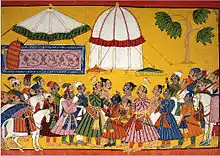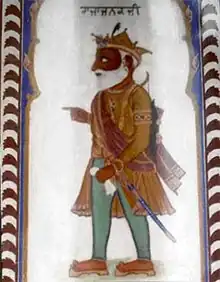Janaka
Janaka was an ancient Hindu king of Videha which was located in Mithila region, approximately in the 8th or 7th century BC.[1] The rulers of the Videha kingdom were called Janakas. He also appears in the epic Ramayana as a father of Sita. His original name was Siradhvaja and he had a brother named Kushadhvaja. His father's name was Hrasvaroman, a descendant of the king Nimi.
| Janaka | |
|---|---|
 | |
| Texts | Ramayana, Upanishads |
| Region | Mithila |
| Personal information | |
| Parents | Hrasvaroman (father), Keikasi (mother) |
| Siblings | Kushadhvaja |
| Spouse | Sunayana |
| Children | Sita, Urmila (daughters) |
| Dynasty | Ikshvaku |
Janaka is revered as being an ideal example of non-attachment to material possessions. He was intensely interested in spiritual discourse and considered himself free from worldly illusions. His interactions with sages and seekers such as Ashtavakra and Sulabha are recorded in the ancient texts. His relationship with his adopted daughter Sita led her to be called Janaki. The city of Janakpur in Nepal is named after him and his daughter Sita.[2] The Videha (or Mithila) kingdom was historically located between east of Gandaki River, west of Mahananda River, north of the Ganga river and south of the Himalayas.[3][4]
Ancestry
King Nimi was the first ruler of the Videha kingdom. Janaka was descended from Vishnu in the following order:—Brahmā,—Marīci—Kaśyapa—Vivasvān—Vaivasvata—Ikṣvāku—Nimi—Mithi—Udāvasu—Nandivardhana—Suketu—Devarāta—Bṛhadratha—Mahāvīra—Sudhṛti—Dhṛṣṭaketu—Haryaśva—Maru—Pratvantaka—Kīrtiratha—Devamīḍha—Vibudha—Mahīdhraka—Kīrtirāta—Mahāroman—Svarṇaroman—Hrasvaroman—Sīradhvaja (Janaka).[5]
Janaka in Vedic literature

Late Vedic literature such as Shatapatha Brahmana and Brihadaranyaka Upanishad mention a certain King Janaka (c. 8th or 7th century BCE) as a great philosopher-king of Videha, renowned for his patronage of Vedic culture and philosophy and whose court was an intellectual center for Brahmin sages such as Yajnavalkya, Uddalaka Aruni, and Gargi Vachaknavi.[1] Under his reign, Videha became a dominant political and cultural center of the Indian subcontinent.[6]
Other literature

Janaka is the father of Sita, the wife of Rama in the Hindu epic Ramayana. His conversation with the sage Ashtavakra is recorded in the Ashtavakra Gita, wherein he is depicted as one who is realised and this was tested by the sage Ashtavakra. Many spiritual teachers have referred to this writing often translating and deducing its meaning.[7][8]
References
Citations
- Raychaudhuri 2006, pp. 41–52.
- Raychaudhuri 2006, p. 44.
- Jha, M. (1997). "Hindu Kingdoms at contextual level". Anthropology of Ancient Hindu Kingdoms: A Study in Civilizational Perspective. New Delhi: M.D. Publications Pvt. Ltd. pp. 27–42. ISBN 9788175330344.
- Mishra, V. (1979). Cultural Heritage of Mithila. Allahabad: Mithila Prakasana. p. 13. Retrieved 28 December 2016.
- www.wisdomlib.org (28 January 2019). "Story of Janaka". www.wisdomlib.org. Retrieved 10 September 2022.
- Michael Witzel (1989), Tracing the Vedic dialects in Dialectes Dans Les literatures Indo-Aryennes ed. Caillat, Paris, 97–265.
- Vanita, Ruth (2009). "Full of God:Ashtavakra and ideas of Justice in Hindu Text". Religions of South Asia. 3 (2). Archived from the original on 2 March 2019. Retrieved 22 February 2017.
- Mukerjee, Radhakamal (1971). The song of the self supreme (Aṣṭāvakragītā): the classical text of Ātmādvaita by Aṣṭāvakra. Motilal Banarsidass Publ. ISBN 978-81-208-1367-0.
Sources
- Dictionary of Hindu Lord and Legend (ISBN 0-500-51088-1) by Anna Dhallapiccola
- Raychaudhuri, Hemchandra (2006), Political History of Ancient India, Cosmo Publications, ISBN 81-307-0291-6
.jpg.webp)
